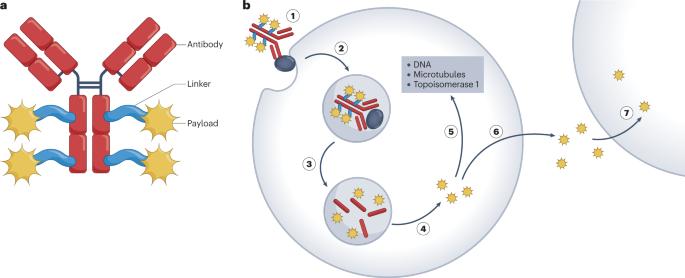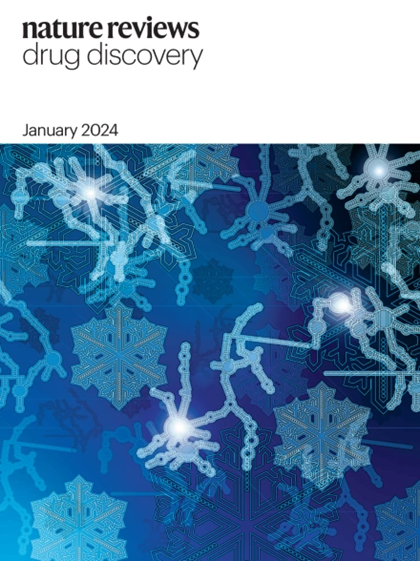Antibody–drug conjugates come of age in oncology
IF 101.8
1区 医学
Q1 BIOTECHNOLOGY & APPLIED MICROBIOLOGY
引用次数: 13
Abstract
Antibody–drug conjugates (ADCs) combine the specificity of monoclonal antibodies with the potency of highly cytotoxic agents, potentially reducing the severity of side effects by preferentially targeting their payload to the tumour site. ADCs are being increasingly used in combination with other agents, including as first-line cancer therapies. As the technology to produce these complex therapeutics has matured, many more ADCs have been approved or are in late-phase clinical trials. The diversification of antigenic targets as well as bioactive payloads is rapidly broadening the scope of tumour indications for ADCs. Moreover, novel vector protein formats as well as warheads targeting the tumour microenvironment are expected to improve the intratumour distribution or activation of ADCs, and consequently their anticancer activity for difficult-to-treat tumour types. However, toxicity remains a key issue in the development of these agents, and better understanding and management of ADC-related toxicities will be essential for further optimization. This Review provides a broad overview of the recent advances and challenges in ADC development for cancer treatment. Antibody–drug conjugates (ADCs) combine the specificity of monoclonal antibodies with the potency of cytotoxic agents. The technology to develop these agents has improved in past years, but toxicity remains a key issue. This Review provides a broad overview of the recent advances and challenges in ADC development for cancer treatment.

抗体-药物共轭物在肿瘤学中的应用进入成熟期
抗体药物共轭物(ADCs)结合了单克隆抗体的特异性和高细胞毒性药物的效力,通过将有效载荷优先靶向肿瘤部位,有可能减轻副作用的严重程度。ADC 越来越多地与其他药物联合使用,包括作为一线癌症疗法。随着生产这些复杂疗法的技术日趋成熟,越来越多的 ADC 已获批准或正在进行后期临床试验。抗原靶点和生物活性有效载荷的多样化正在迅速扩大 ADC 的肿瘤适应症范围。此外,新型载体蛋白格式以及针对肿瘤微环境的弹头有望改善 ADCs 的瘤内分布或激活,从而提高其对难以治疗的肿瘤类型的抗癌活性。然而,毒性仍是这些药物开发过程中的一个关键问题,更好地了解和管理 ADC 相关毒性对进一步优化至关重要。本综述概述了用于癌症治疗的 ADC 开发的最新进展和挑战。抗体药物共轭物(ADC)结合了单克隆抗体的特异性和细胞毒性药物的效力。过去几年中,开发这些药物的技术不断进步,但毒性仍是一个关键问题。本综述概述了用于癌症治疗的 ADC 开发的最新进展和挑战。
本文章由计算机程序翻译,如有差异,请以英文原文为准。
求助全文
约1分钟内获得全文
求助全文
来源期刊

Nature Reviews. Drug Discovery
医学-生物工程与应用微生物
CiteScore
137.40
自引率
0.30%
发文量
227
期刊介绍:
Nature Reviews Drug Discovery is a monthly journal aimed at everyone working in the drug discovery and development arena.
Each issue includes:
Highest-quality reviews and perspectives covering a broad scope.
News stories investigating the hottest topics in drug discovery.
Timely summaries of key primary research papers.
Concise updates on the latest advances in areas such as new drug approvals, patent law, and emerging industry trends and strategies.
 求助内容:
求助内容: 应助结果提醒方式:
应助结果提醒方式:


